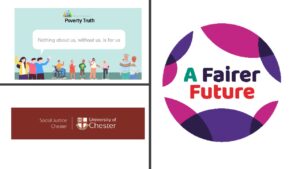Data Impact 2024: Poverty in Data

In a period where the cost of living has risen dramatically and levels of those falling into poverty and deprivation are high, data-enhanced research can help us understand people’s situations and offer positive options for policy and other change.
Rarely before have the data been so supportive in providing a clear picture of the situation and in enabling researchers, policymakers and more to develop, assess and advocate for practical solutions. And yet there is more work to be done, both in terms of advocating for the needs of those who are struggling and discovering where gaps in the data may still exist.
The UK Data Service 2024 impact event Poverty in Data took place across three days in April.
Early Career Researchers Workshop
What happened?
Donald Hirsch, Emeritus Professor of Social Policy at Loughborough University and previously Director of the Centre for Research in Social Policy, gave a keynote speech looking at research in poverty. The recording of this talk can be viewed below. There were also several roundtable discussions and a Q&A panel with previous Data Impact Fellows: Ben Brindle, Bozena Wielgoszewska, Christian Reynolds and Rachel Oldroyd.
You can download the slides from this presentation here.
Poverty in Data: Perspectives on Poverty
This session includes:

Christina Adane speaking about her work in poverty campaigning and on the current issues that are impacting people. Christina was founding co-chair of Bite Back’s youth board, a youth-led movement fighting the injustices of the food industry. She fronted national campaigns over the years such as extending free school meal provision over lockdown, which garnered 450,000 signatures on her petition which led to a government U-turn in the May half-term. Marcus Rashford then spearheaded this campaign during the summer holidays.

Professor Nissa Finney gives an introduction to the recently launched Evidence for Equality National Survey which provides novel data on experience and inequalities for ethnic and religious minorities in Britain. She will focus on the importance of inclusive data, and challenges of producing them and achieving impact.

Social Justice Chester and West Cheshire Community inspirers showcase their collaborative research including an interactive research exhibition showcasing the lived reality of poverty co-produced with the Inspirers. They also present a video on how co-production can work in this research space and a photo-based research piece that gives the perspectives of the Inspirers and their experiences of poverty.
Poverty in Data: Research, policy and next steps
This session includes presentations by a panel of researchers using data to enhance understanding of poverty and to develop, assess and advocate for practical solutions and/or policy changes, followed by Q&A.
The panel was made up of:
Ed Davies – Policy Director, The Centre for Social Justice
Helen Barnard – Director of Policy, Research and Impact, The Trussell Trust
Lalitha Try – Economist, Resolution Foundation
Peter Matejic – Chief Analyst, The Joseph Rowntree Foundation
You can download the full slideshow from the four presentations here.
